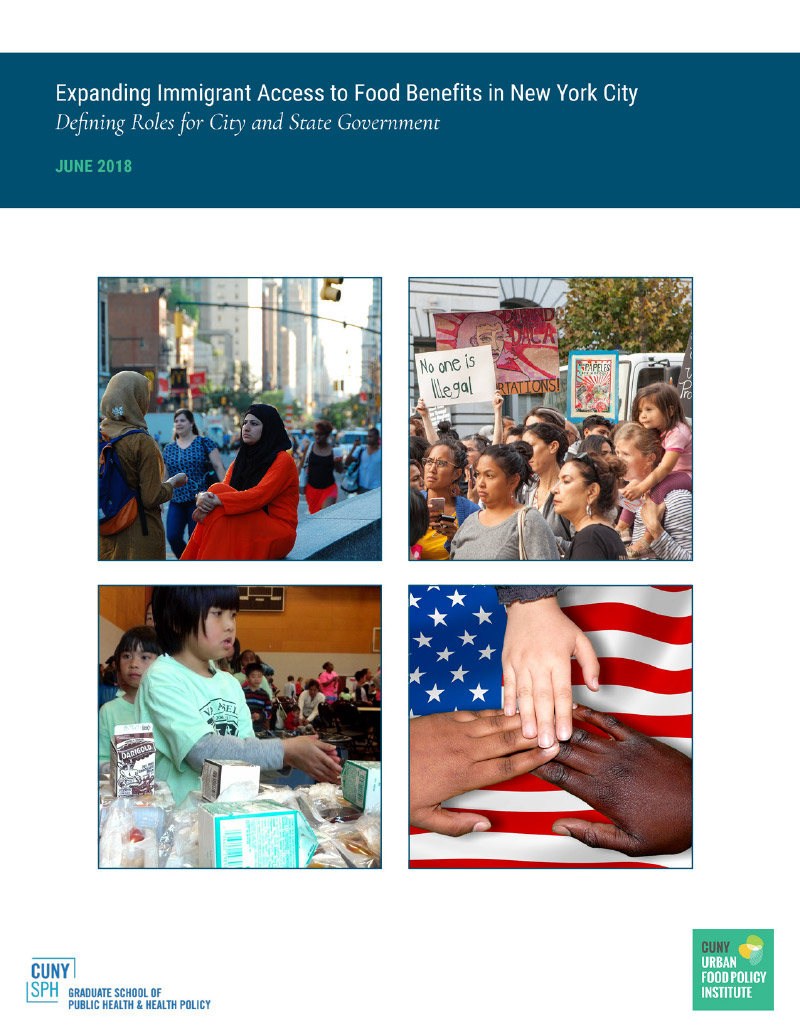For more than 50 years, the Supplemental Nutrition Assistance Program (SNAP) has helped millions of Americans to avoid hunger, improve their health and alleviate the consequences of poverty. Two other federal programs Women, Infants, and Children (WIC) and School Food have for decades provided similar protections for pregnant women, new mothers and their young children and school children, respectively.
From its earliest days, the United States has debated immigration policy, at times restricting access for some and at other times welcoming groups from many nations. Today, President Trump and Congress are acting to reverse two American traditions, providing food support for the hungry and welcoming those from other nations. New York City and State have both the obligation and the opportunity to chart new paths in creating city, state and community programs that reaffirm these core American values.
In its new report, Expanding Immigrant Access to Food Benefits in New York City: Defining Roles for City and State Government, the CUNY Urban Food Policy Institute examines how the intersection of these two trends—restricting immigration and cutting back food assistance—is affecting immigrants in New York City. Our goal is to provide evidence that can inform New York City and State policy initiatives that can protect and restore the basic American values of feeding the hungry and welcoming immigrants. We also hope to join with others around the country to ensure that immigrants are treated fairly and provided with the basic resources and protections needed to maintain good health.
Based on interviews with frontline workers and managers at New York City immigrants’ rights and food security organizations and a review of experiences in other U.S. cities, the report recommends four strategies for protecting and expanding access to public food benefits for immigrants in New York City.
Recommendations
- Create and expand programs with city and state funding that bring food assistance to immigrants with minimal or no requirement for documentation.
- Develop and expand multi-pronged communications and policy initiatives to reduce stigma against immigrants.
- Strengthen the linguistic, cultural, and organizational capacity of community organizations and social service agencies that serve immigrants.
- Improve outreach, enrollment, and education initiatives of community and public agencies that serve immigrants to ensure that all immigrants are enrolled in food programs for which they are eligible and that they are fully aware of their rights.
By concretizing and acting on these recommendations, immigrants’ rights and food security groups, city and state government and others can demonstrate an alternative to the policies coming from the President and Congress.
If you would like to participate in the CUNY Urban Food Policy Institute’s collaborative effort to advance these recommendations, send your name, contact information and your individual and organizational experience addressing food insecurity among immigrants to urbanfoodpolicy@sph.cuny.edu.
Acknowledgements
Many individuals and organizations contributed to this report. We thank the 50 individuals from 30 organizations who responded to our survey and the seven leaders of food security and immigrant serving organizations who agreed to be interviewed. Institute staff members who contributed to this report include Nevin Cohen, Anabel Perez-Jimenez, Jan Poppendieck, and Craig Willingham. We thank the Sociological Initiatives Foundation and New York Community Trust for their support for this project. This report reflects the interpretations and opinions of its authors not our funders, employers, or informants.
Suggested Citation
Vignola E, Ruiz-Navarro P, Freudenberg N. Expanding Immigrant Access to Food Benefits in New York City: Defining Roles for City and State Government. CUNY Urban Food Policy Institute, 2018.
